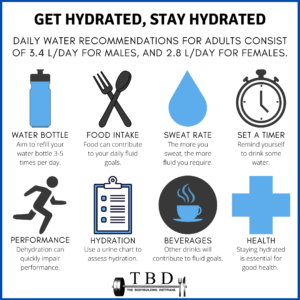Did you ever wonder just how important staying hydrated is for your overall health? Well, the answer might surprise you. Hydration plays a vital role in maintaining your body’s functionality and well-being. From regulating body temperature to helping with digestion and nutrient absorption, staying properly hydrated is crucial for optimal health. So, grab a glass of water and let’s dive deeper into why hydration is so important for your body.
Curious to learn more about why hydration is essential for your health? In this article, we’ll explore the various benefits that come with staying hydrated. We’ll discuss how hydration impacts your energy levels, brain function, and even your exercise performance. Additionally, we’ll delve into the signs of dehydration and provide practical tips on how to stay properly hydrated throughout the day. By the end of this article, you’ll have a comprehensive understanding of just how crucial it is to prioritize hydration for your overall health and well-being.
What is hydration?
Definition of hydration
Hydration refers to the process of providing the body with adequate fluids to maintain optimal physiological functions. When we talk about hydration, we often think of drinking water, but it also includes consuming other fluids and foods that contain water.
How does hydration work in the body?
Hydration is essential for the proper functioning of every cell, tissue, and organ in your body. Water makes up a significant portion of your body composition, ranging from 50% to 75% depending on various factors such as age, sex, and body composition. It plays vital roles in various bodily functions, including:
-
Regulating body temperature: Water helps regulate your body temperature through sweating and evaporation. When you become overheated, your body produces sweat to cool down, and water is lost in the process. Replenishing fluids helps maintain a stable body temperature.
-
Lubricating joints: Water helps cushion and lubricate joints, promoting smooth movement and reducing the risk of joint pain and discomfort.
-
Transporting nutrients: Water acts as a transporter, delivering essential nutrients and oxygen to your cells. It aids in digestion, absorption, and the distribution of nutrients throughout your body.
-
Flushing waste: Proper hydration supports the elimination of waste products through urine and sweat, preventing the buildup of toxins in your body.
-
Maintaining electrolyte balance: Electrolytes, such as sodium, potassium, and calcium, are essential for various bodily functions. Water helps maintain the balance of electrolytes, ensuring proper muscle and nerve function.
Why is hydration important for health?
Maintains bodily functions
Water is the foundation of life, and without adequate hydration, our bodies cannot function optimally. Meeting your daily hydration needs helps maintain the proper functioning of your cells, organs, and systems, allowing your body to perform at its best.
Prevents dehydration
Dehydration occurs when your body loses more fluids than it takes in. This can happen due to various factors, such as excessive sweating, vomiting, diarrhea, or inadequate fluid intake. Dehydration can range from mild to severe and can have significant consequences for your health. It can lead to symptoms such as thirst, fatigue, dry mouth, dizziness, and dark-colored urine. Severe dehydration may require medical intervention and can be life-threatening. Staying hydrated helps prevent dehydration and ensures the proper functioning of your body.
Regulates body temperature
Maintaining a stable body temperature is crucial for overall health. When you are in a hot environment or engage in physical activity, your body temperature rises, and you start sweating to cool down. Sweating leads to fluid loss, and if you don’t replenish those fluids, your body temperature can rise to dangerous levels. By staying hydrated, you can regulate your body temperature more effectively and reduce the risk of heat-related illnesses.
Supports cardiovascular health
Proper hydration is essential for maintaining cardiovascular health. Blood is primarily composed of water, and dehydration can lead to decreased blood volume and thicker blood consistency. This puts added strain on the heart, making it work harder to pump blood throughout the body. Chronic dehydration can contribute to high blood pressure, increased heart rate, and other cardiovascular issues. By staying hydrated, you can support the health and efficiency of your cardiovascular system.
Promotes cognitive function
Your brain is closely connected to your hydration status. Even mild dehydration can impair cognitive function, including memory, attention, and concentration. Studies have shown that dehydration can negatively impact mood, lead to increased feelings of fatigue and anxiety, and impair overall cognitive performance. By staying properly hydrated, you can enhance your cognitive function and maintain mental clarity throughout the day.
Aids digestion and nutrient absorption
Water plays a crucial role in digestion and nutrient absorption. It helps break down food, facilitates the movement of nutrients across the intestinal walls, and supports the overall digestive process. Insufficient hydration can lead to constipation and other digestive issues. By staying hydrated, you can promote healthy digestion and maximize the absorption of essential nutrients from your food.
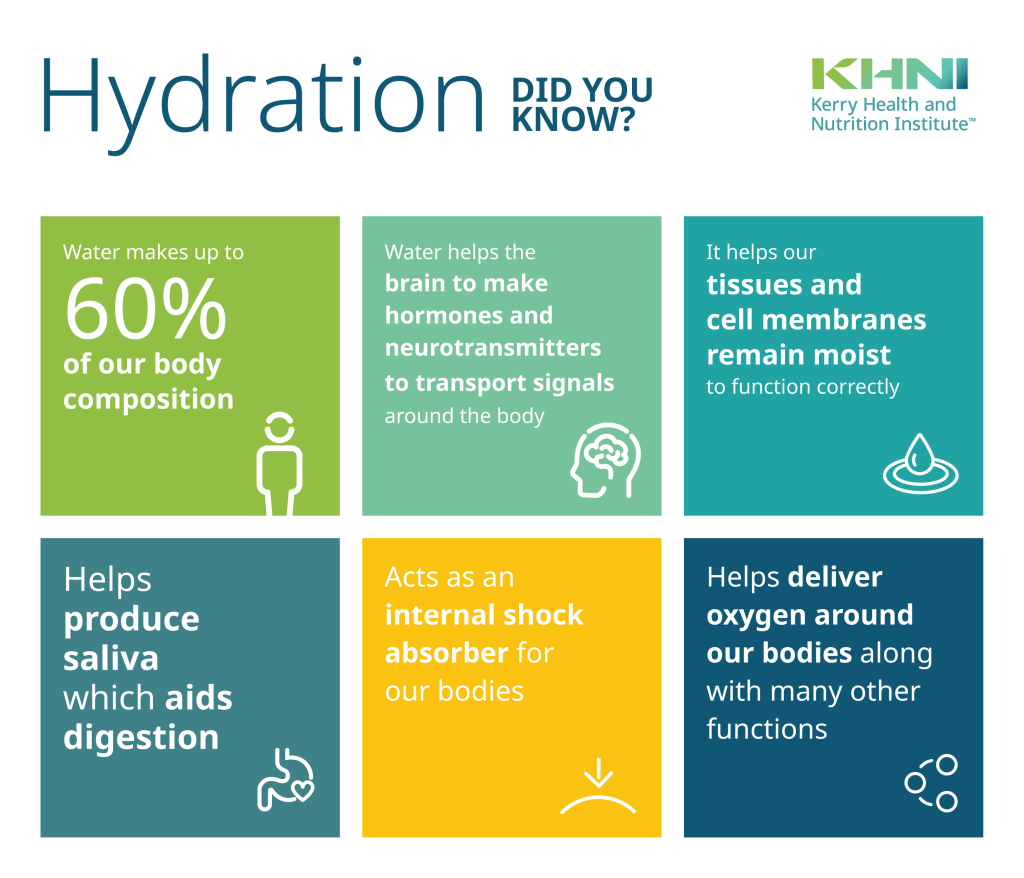
This image is property of khni.kerry.com.
Signs and symptoms of dehydration
Thirst
Thirst is the body’s way of signaling that it needs more fluids. It is a common and often ignored early warning sign of dehydration. If you are feeling thirsty, it’s essential to drink water or other hydrating beverages to satisfy your body’s fluid needs.
Fatigue
Dehydration can lead to feelings of fatigue and low energy levels. When your body lacks adequate fluids, it has to work harder to perform its functions, leading to decreased energy levels and increased feelings of tiredness.
Dry mouth and lips
Dry mouth and lips are common signs of dehydration. When you are dehydrated, your body doesn’t produce enough saliva, resulting in a dry mouth. Your lips may also become dry, cracked, and chapped. Drinking water can help alleviate these symptoms and rehydrate your body.
Headache
Dehydration can cause headaches and migraines in some individuals. When you are dehydrated, the brain can temporarily shrink or contract, leading to tension and headaches. Rehydrating with water can often help relieve these headaches and restore your well-being.
Dizziness or lightheadedness
Inadequate hydration can cause a drop in blood pressure, leading to dizziness or lightheadedness. If you experience these symptoms, it’s essential to rehydrate and rest to avoid any accidents or injuries.
Dark-colored urine
The color of your urine can be an indicator of your hydration status. When your body is properly hydrated, your urine should be clear or light yellow. Dark-colored urine is a sign of concentrated urine, suggesting that you may be dehydrated and should increase your fluid intake.
Factors influencing hydration needs
Activity level
Your activity level plays a significant role in determining your hydration needs. If you engage in moderate to intense physical activity or exercise, you will lose more fluids through sweat and require additional hydration to replenish what was lost. It’s crucial to drink water before, during, and after physical activity to maintain proper hydration levels.
Climate and environment
The climate and environment you are in can also affect your hydration needs. In hot and humid weather, you are more likely to sweat and lose fluids, increasing your need for hydration. Additionally, high altitudes can contribute to increased fluid loss, as the air tends to be drier. Adjusting your fluid intake based on these factors is essential to staying adequately hydrated.
Individual physiology
Individuals have unique physiological differences that can affect their hydration needs. Factors such as body size, metabolism, and overall health can influence how much water each person needs. It’s important to listen to your body and drink when you are thirsty, but also be proactive in maintaining regular fluid intake throughout the day.
Medical conditions and medications
Certain medical conditions and medications can affect your hydration status. Some conditions, such as diabetes or kidney disease, can lead to increased fluid loss, requiring closer monitoring of hydration levels. Certain medications, such as diuretics, can also increase urine output, leading to higher fluid needs. If you have any medical conditions or take medications, it’s important to consult with your healthcare provider to determine your optimal hydration strategies.
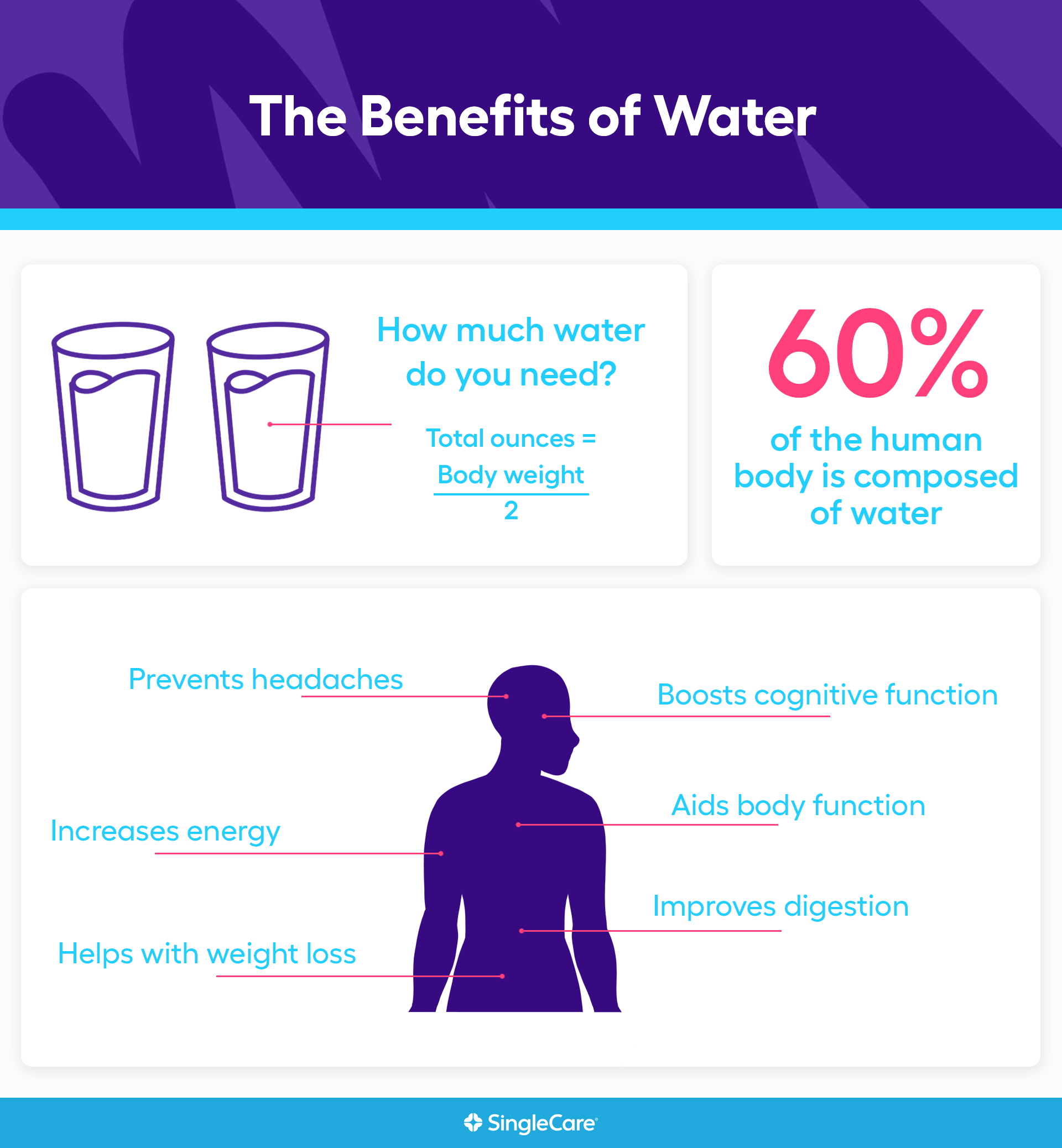
This image is property of www.singlecare.com.
Optimal hydration strategies
Drink plenty of water
Water is the best hydrating fluid you can consume. It has no calories, sugars, or additives and is readily accessible to most. The general recommendation is to drink at least 8 cups, or about 64 ounces, of water per day. However, individual hydration needs can vary based on factors such as age, sex, weight, activity level, and climate.
Include hydrating foods and beverages
In addition to drinking water, you can also increase your fluid intake through hydrating foods and beverages. Foods such as fruits and vegetables have high water content and can contribute to your overall hydration. Additionally, beverages such as herbal teas, 100% fruit juices, and smoothies can provide both hydration and additional nutrients.
Monitor urine color
Monitoring the color of your urine can be a simple way to gauge your hydration status. As mentioned earlier, clear or light yellow urine indicates good hydration, while dark-colored urine suggests dehydration. Remember to adjust your fluid intake accordingly if you notice changes in urine color.
Drink before, during, and after exercise
When you engage in physical activity or exercise, it’s essential to stay hydrated to replace the fluids lost through sweat. Drink water before, during, and after your workout to maintain proper hydration levels. If you are exercising for an extended period or in high-intensity conditions, you may also consider consuming electrolyte-rich sports drinks to replenish lost electrolytes.
Use electrolyte-rich drinks when necessary
Electrolyte-rich drinks, such as sports drinks or coconut water, can be beneficial in specific situations where electrolyte balance needs to be restored. These drinks contain minerals like sodium, potassium, and magnesium, which are lost through sweat and can help rehydrate and replenish electrolyte levels. However, it’s important to note that for everyday hydration needs, water is sufficient for most individuals.
Hydration myths debunked
8 cups of water a day requirement
Contrary to popular belief, there is no specific requirement for drinking eight cups of water per day. Hydration needs vary among individuals, and factors such as body size, activity level, and climate play a role in determining individual needs. It’s important to listen to your body and drink when you are thirsty, as thirst is a reliable indicator of your hydration needs.
Thirst is not a reliable indicator of hydration
Thirst is a reliable indicator of hydration and should not be ignored. When your body needs fluids, it triggers the sensation of thirst to signal you to drink water. It’s important to listen to your body and drink when you are thirsty to maintain proper hydration.
Caffeinated beverages cause dehydration
There is a common misconception that caffeinated beverages, such as coffee and tea, can dehydrate you. While caffeine is a diuretic, meaning it can increase urine production, moderate consumption of caffeinated beverages does not lead to significant fluid loss or dehydration. As long as you consume these beverages in moderation and balance them with adequate water intake, they can contribute to your overall hydration.
You can’t overhydrate
While proper hydration is crucial for good health, it’s also possible to consume too much water. Overhydration, or water intoxication, can occur when you drink excessive amounts of water in a short period, overwhelming your body’s ability to process and eliminate it. This condition can be life-threatening in extreme cases. It’s important to strike a balance and consume fluids in moderation to avoid overhydration.
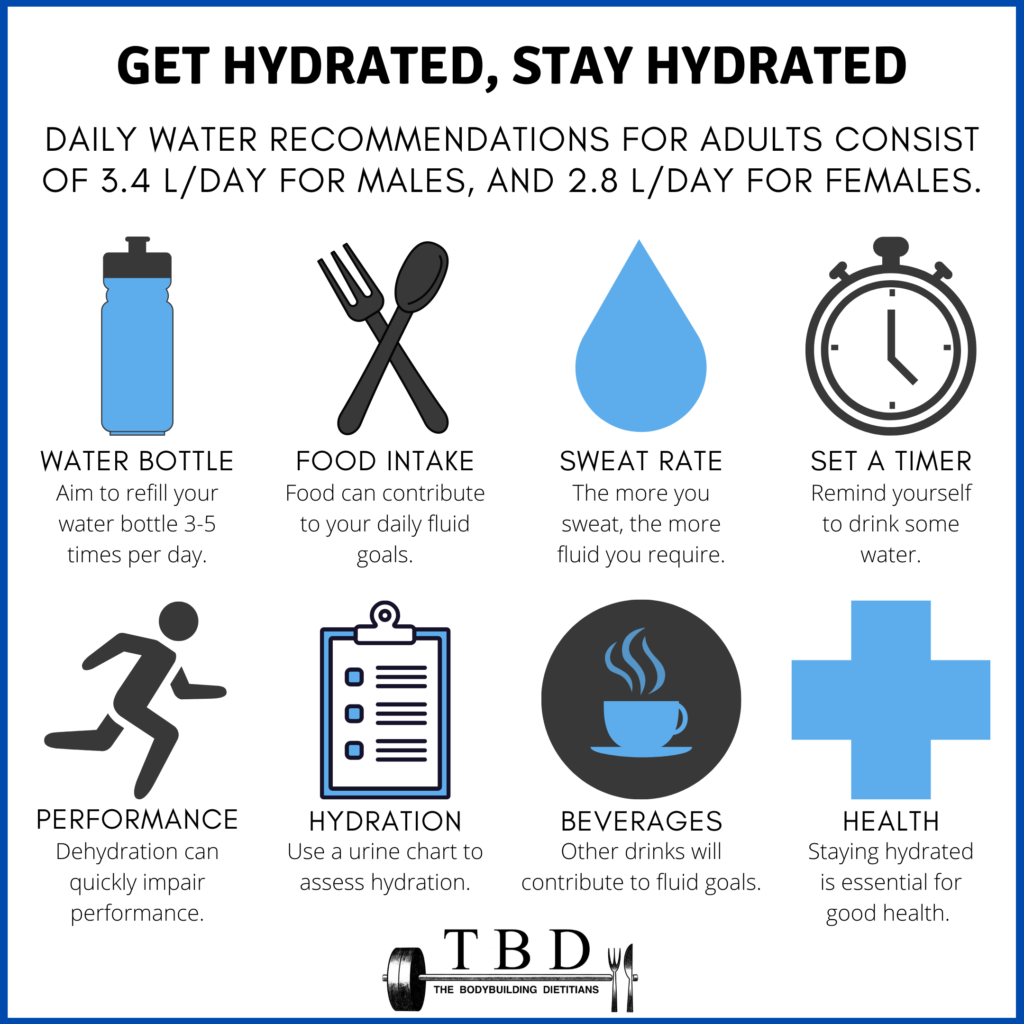
This image is property of images.squarespace-cdn.com.
Effects of chronic dehydration
Kidney stones
Chronic dehydration can increase the risk of developing kidney stones. When you are dehydrated, the concentration of minerals and salts in your urine increases, promoting the formation of crystals that can eventually lead to kidney stone formation. Staying properly hydrated helps prevent the buildup of these minerals and reduces the likelihood of kidney stones.
Digestive issues
Inadequate hydration can contribute to digestive issues such as constipation. When your body lacks sufficient fluids, the colon absorbs more water from the stool, making it harder and more difficult to pass. This can lead to discomfort and irregular bowel movements. Maintaining proper hydration levels can help promote regularity and prevent digestive issues.
Impaired physical performance
Dehydration can significantly impact physical performance and athletic abilities. When you are dehydrated, your body cannot cool itself efficiently, leading to increased fatigue, reduced endurance, and decreased strength. Proper hydration is essential for optimizing physical performance and maximizing your potential during exercise and sports activities.
Poor skin health
Your skin is the largest organ in your body, and proper hydration is essential for maintaining its health and appearance. Dehydration can lead to dry and flaky skin, increased wrinkles and fine lines, and a dull complexion. By staying well-hydrated, you can promote healthy, glowing skin and delay the signs of aging.
Hydration tips for special populations
Pregnant and breastfeeding women
Pregnant and breastfeeding women have increased hydration needs to support the growth and development of their babies and maintain their own health. It is recommended for pregnant women to drink about 10 cups, or 80 ounces, of fluid per day, and breastfeeding women to drink about 13 cups, or 104 ounces, of fluid per day. It is important for these women to consult with their healthcare provider for personalized recommendations.
Children and adolescents
Children and adolescents have unique hydration needs due to their growing bodies and increased physical activity levels. It is important to encourage children to drink water regularly throughout the day, especially during hot weather and physical activities. Parents and caregivers should be mindful of promoting healthy hydration habits in children and providing them with easy access to water.
Elderly individuals
As people age, their sense of thirst may diminish, leading to decreased fluid intake and increased risk of dehydration. Elderly individuals should make a conscious effort to drink water throughout the day, even if they don’t feel thirsty. It can be helpful to set reminders or have a water bottle within reach to encourage regular fluid intake.
Athletes and active individuals
Athletes and individuals who engage in intense physical activity have higher fluid needs due to increased sweat and fluid losses. It’s crucial for these individuals to stay hydrated before, during, and after exercise to prevent dehydration and optimize performance. Drinking water or sports drinks that contain electrolytes can help replenish fluids and maintain electrolyte balance.
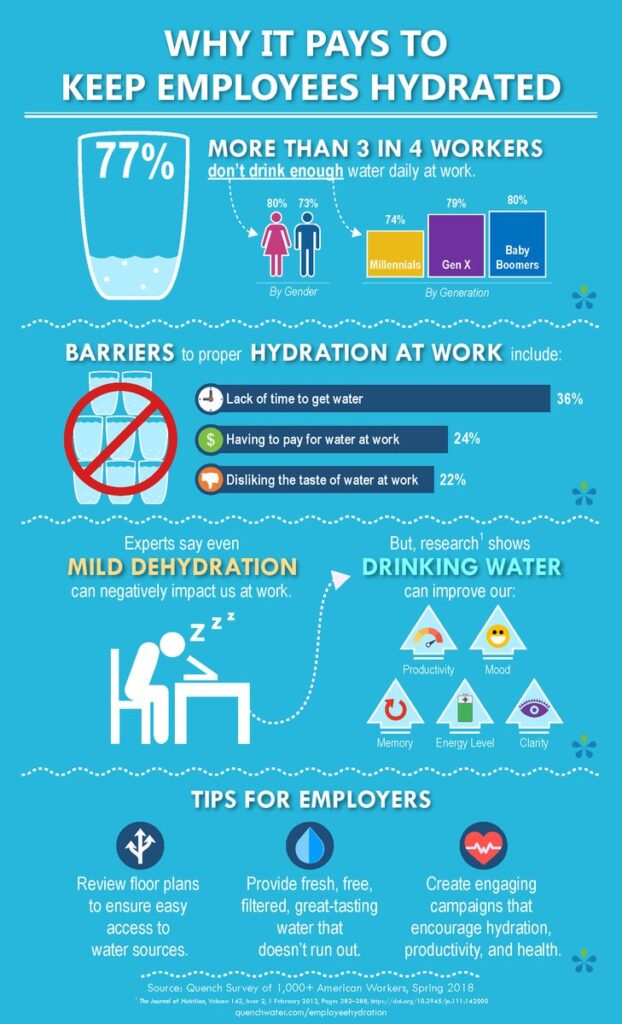
This image is property of quenchwater.com.
Common misconceptions about hydration
Only athletes need to worry about hydration
Hydration is not only important for athletes but for everyone. Maintaining proper hydration is essential for overall health and well-being. Every individual, regardless of their level of physical activity, should prioritize staying properly hydrated.
Water from fruits and vegetables is enough
While hydrating foods such as fruits and vegetables can contribute to your overall fluid intake, it’s important to remember that these sources alone may not be sufficient to meet your hydration needs. Drinking water and other hydrating beverages is still necessary to ensure optimal hydration.
Thirst means you’re already dehydrated
Thirst is a natural mechanism that signals your body’s need for fluids. It is not an indication that you are already dehydrated but rather a reminder to drink water and maintain your hydration status. Listening to your body and responding to thirst cues is essential for staying hydrated.
Coffee and tea don’t contribute to hydration
Contrary to popular belief, moderate consumption of coffee and tea can contribute to your overall fluid intake and hydration. While these beverages contain caffeine, they can still hydrate you when consumed in moderation. However, it’s important to note that excessive consumption of caffeinated beverages may have diuretic effects, promoting fluid loss.
Conclusion
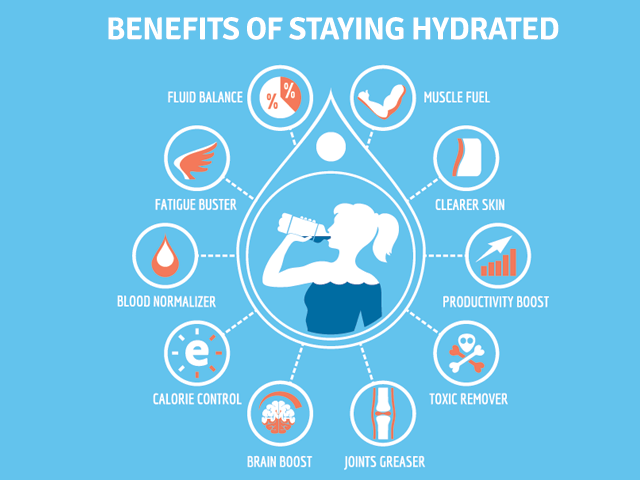
This image is property of www.girlsgonestrong.com.

